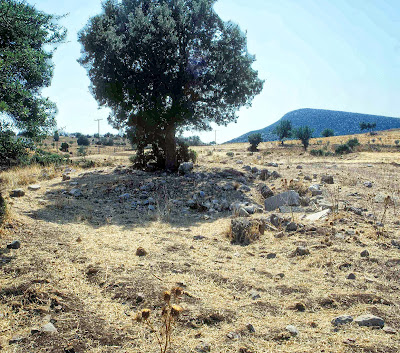The 'settlement' of Tracheia dominated the Tracheia valley in the SE Argolid.
 |
| The route between Epidauros and Troizen led through the Trachia Valley and then skirting the mountains to the coast just S of the Methana peninsula and then on to Troizen. |
There were two towers protecting the entrance to the valley from the S. The first is the Mnema tou Andreiomenou.[1]
A second, unnamed, building (presumably a small fort with tower) stood about 800 m to its north on a low hill. Perhaps the hill at 37.544871° N, 23.140036° E is intended.[2]
The only other structure that may be identified is a small sanctuary in the neighborhood (In der Nähe) of the second tower, perhaps near 37.544343° N, 23.143016° E.[3]
Footnotes
[1] For the Mnema tou Andreiomenou see Tausend [2006] 154. Blomley [2022] 253. '77. TOU ANTREIOMENOU TO MNEMA 1 ... '.
[2] For this second tower: Tausend [2006] 154. ' ... befinden sich auf einem flachen Hügel die Reste eines zweiten Baues ... '
[3] Unwin [2020] npn. " [footnote] 41 A klidophoros is attested at Side (I.Side 17), while kleidophoroi are also among a delegation sent from Laodikeia-on-the-Lykos to Klaros in the second century CE (Ferrary [2014], no. 40). The variant klakophoros is found at Apollonia in Illyria (I.Apollonia 16) and at Messene (IG V 1.1447); see the discussion of Quantin (2004), p. 596–600. A hero called Klaikophoros is attested at Epidauros in the third century BCE (IG IV² 1.297)."
It is not now possible to say of what the settlement of Tracheia consisted. From Faraklas (through Blomley) we learn of a 'fort' or 'fortified settlement' lying on a low hill somewhere to the SW of modern Tracheia.[4] The settlement may have been of some significance because of the presence of the towers at the entry of the valley and, also, the presence of a major fortification at Bedeni Kiapha (C1081) on the valley's east side.[5]
Some confusion attends the location of the settlement. Blomley says that the settlement of Tracheia is situated on " ... a low hill SW of Tracheia."[6] On the S or SE sides of that hill Faraklas found ' ... ' ... traces of a wall on the S and SE of the hill.'
Some confusion attends the location of the settlement. Blomley says that the settlement of Tracheia is situated on " ... a low hill SW of Tracheia."[6] On the S or SE sides of that hill Faraklas found ' ... ' ... traces of a wall on the S and SE of the hill.'
Simpson and Dickenson say "A LH site was reported near the village of Trachia, on the route between the Asklepieion at Epidauros and Troizen."[7]
Anne Foley says "This site is situated in S central Epidauria about 500 m NW of modern Tracheia." This would put it in the precise opposite direction from Blomley.
I suspect that the settlement of this little valley stretched to the S and W of the current modern town and back towards the 'small sanctuary' mentioned by Tausend. I show the final suggested disposition for these various points of interest in the next map:
Footnotes
[1] For the Mnema tou Andreiomenou see Tausend [2006] 154. Blomley [2022] 253. '77. TOU ANTREIOMENOU TO MNEMA 1 ... '.
[2] For this second tower: Tausend [2006] 154. ' ... befinden sich auf einem flachen Hügel die Reste eines zweiten Baues ... '
[3] Unwin [2020] npn. " [footnote] 41 A klidophoros is attested at Side (I.Side 17), while kleidophoroi are also among a delegation sent from Laodikeia-on-the-Lykos to Klaros in the second century CE (Ferrary [2014], no. 40). The variant klakophoros is found at Apollonia in Illyria (I.Apollonia 16) and at Messene (IG V 1.1447); see the discussion of Quantin (2004), p. 596–600. A hero called Klaikophoros is attested at Epidauros in the third century BCE (IG IV² 1.297)."
[3a] Tausend [2006] Abb. 212. "212 Heiligtum von Philanorion".
[4] Blomley [2022] 293, '158. TRACHEIA (Τραχειά)'.
[5] For the Bedeni Kiapha fortress see Blomley [2022] Fig. 6.42, and 184, '16. BENTENI KIAPHA (Μπεντένι Κιάφα, Μπάφι)'.
[6] Blomley [2022] 293.
[7] Simpson and Dickenson [1979] 54, 'A 31 Trachia'.
Bibliography
Blomley [2022] : Blomley, Anna Magdalena. A Landscape of Conflict? Rural Fortifications in the Argolid (400-146 BC), Archaeopress Publishing Ltd., Oxford. ISBN: 978-1-78969-971-5 (e-Pdf). 2022. A precis and first 20 pages are here.
Faraklas [1972] : Faraklas, N., Ancient Greek Cities, xii: ’Επiδαυρος. Athens. 1972.
Simpson and Dickenson [1979] : Simpson, Richard Hope and O.T.P.K. Dickinson, Gazetteer of Aegean Civilisation in the Bronze Age, Vol. I: The Mainland and Islands, Göteborg, Paul Astroms Förlag, 1979.
Tausend [2006] : Tausend, Klaus, Verkehrswege der Argolis: Rekonstruktion und historische Bedeutung, Geographica Historica (Gh), Franz Steiner Verlag, 2006, ISBN-13: 978-3515089432.
Unwin [2020] : Unwin, Naomi Carless. 'Basket-Bearers and Gold-Wearers: Epigraphic Insights into the Material Dimensions of Processional Roles in the Greek East', Kernos (33) 33-125. 2020. Online here.






No comments:
Post a Comment